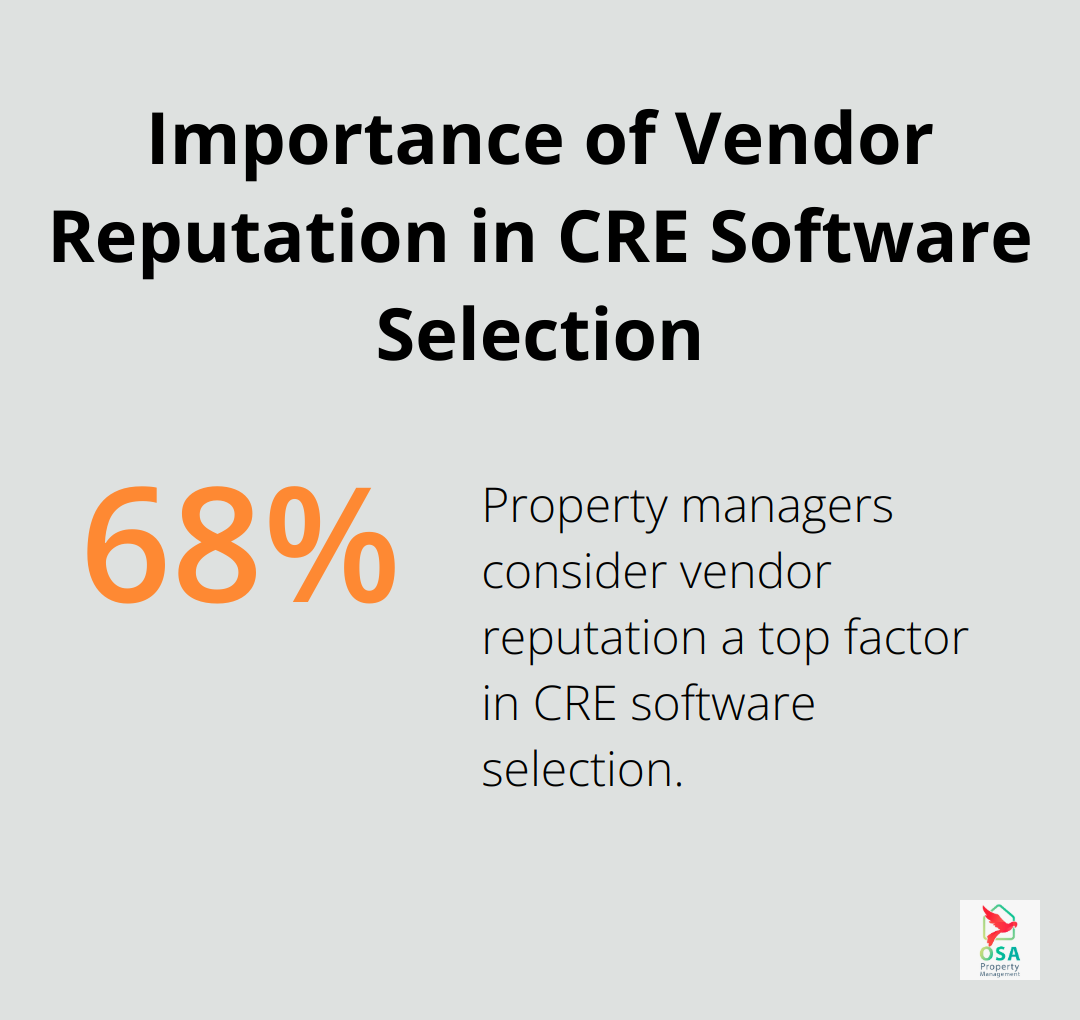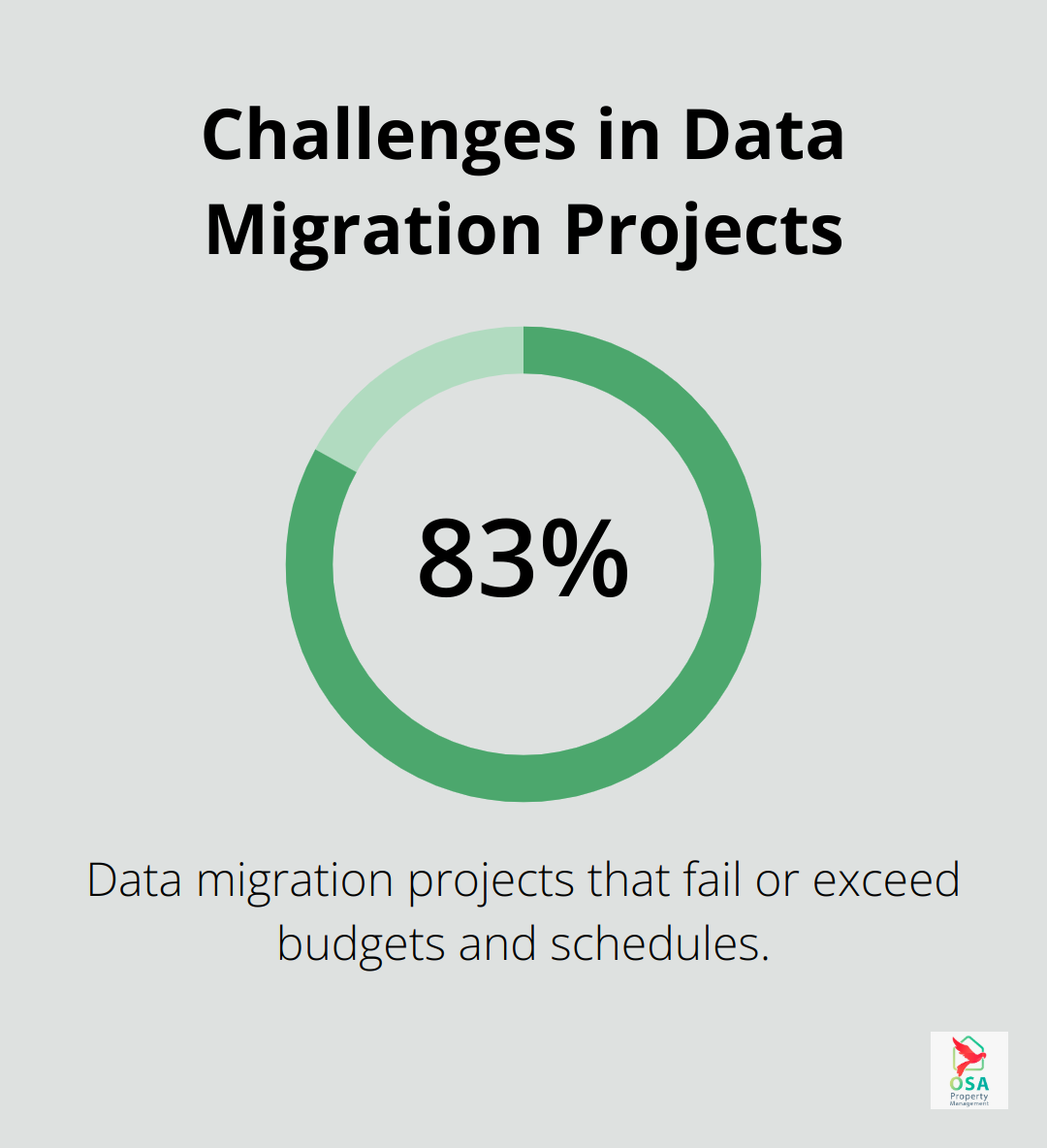Choosing the right property management software for commercial real estate can be a game-changer for your business. At Osa Property Management, we understand the challenges of managing complex CRE portfolios.
Effective software streamlines operations, enhances tenant satisfaction, and boosts your bottom line. In this post, we’ll guide you through the key factors to consider when selecting the ideal solution for your needs.
Essential Features for CRE Property Management Software
When you select property management software for commercial real estate (CRE), you must focus on key features that will streamline your operations and boost efficiency. The right software can transform CRE management.
Financial Management and Accounting
Top-tier CRE property management software should offer robust financial tools. Look for features like automated rent collection, expense tracking, and budget forecasting. Recent statistics highlight the importance of comprehensive financial tools in property management software.
Tenant and Lease Management
Effective tenant and lease management forms the backbone of successful CRE operations. Your software should provide lease tracking, tenant screening, and communication tools. A study by the Institute of Real Estate Management found that property managers using advanced lease management software experienced a 15% reduction in late payments (and a 20% decrease in lease violations).

Maintenance and Work Order System
A streamlined maintenance process is vital for tenant satisfaction and property upkeep. Try to find software that offers mobile-friendly work order submission, tracking, and vendor management. The Building Owners and Managers Association reports that properties using digital maintenance management systems see a 30% reduction in response times for maintenance requests.
Reporting and Analytics
Data-driven decision-making is key in CRE. Your software should provide customizable reports and real-time analytics on occupancy rates, financial performance, and maintenance costs. A Deloitte report suggests that potential changes to transfer pricing and profit-sharing, as well as increases in tax rates, could significantly impact CRE firms.
When you evaluate these features, consider your specific portfolio needs. The principles of effective property management software apply across various property types (office buildings, retail spaces, or industrial properties). Choose software with these core features to set yourself up for success in the competitive world of commercial real estate.
Now that we’ve covered the essential features, let’s move on to evaluating software vendors and solutions to ensure you make the best choice for your CRE management needs.
How to Evaluate CRE Software Vendors
Research Market Options
The CRE software market offers diverse solutions. Property managers should dedicate time to explore multiple vendors, read industry reviews, and create a shortlist based on specific needs. A recent survey indicates that 45% of property managers invest at least one month in research before selecting a software solution. This thorough approach ensures a well-informed decision.
Assess Vendor Reputation
A vendor’s track record provides valuable insights. CRE professionals should prioritize providers with a strong presence in the sector and positive feedback from similar businesses. The National Association of Realtors reports that 68% of property managers consider vendor reputation as a top factor in their decision-making process. Online reviews, client references, and recommendations from other CRE professionals can guide this assessment.

Cloud-based vs. On-premise Solutions
The choice between cloud-based and on-premise solutions impacts operations significantly. Cloud-based systems offer flexibility, automatic updates, and lower upfront costs. However, on-premise options may suit those with specific security requirements or unique customization needs.
Integration Capabilities
CRE software should complement existing tech stacks. Bringing data at one centralized digital location is among the biggest advantages of advanced software integration. Professionals should prioritize solutions that offer robust APIs and pre-built integrations with popular accounting, CRM, and property management tools.
Long-term Partnership Considerations
The evaluation process extends beyond features. CRE professionals should consider the long-term partnership they’re entering. A vendor’s commitment to ongoing development, customer support, and industry expertise can significantly influence the software’s success.
As we move forward, let’s explore the implementation and training considerations that will ensure a smooth transition to your chosen CRE property management software.
Implementing Your CRE Software Solution
Data Migration and System Setup
The first step in implementation involves the migration of existing data to the new system. This process can present challenges, especially for large CRE portfolios. A recent survey by Gartner revealed that 83% of data migration projects either fail or exceed their budgets and schedules. To avoid this pitfall, create a detailed migration plan that includes data cleaning, mapping, and validation steps.

Start with an audit of your current data. Identify the information that needs transfer and its required format. Many CRE software providers offer data migration services or tools to simplify this process. For mid-sized portfolios, companies report an average data migration time of 4-6 weeks when implementing popular CRE management solutions.
Staff Training and User Adoption
The effectiveness of software depends on its users. Proper training ensures your team can leverage all the features of your new CRE management system. Software training programs for property management teams can boost productivity.
Develop a structured training program that covers all aspects of the software. Include hands-on sessions, video tutorials, and reference guides. Many software providers offer online learning platforms. These self-paced courses have shown to reduce the learning curve by up to 40% for new users.
Customization for Specific CRE Needs
Every CRE portfolio has unique requirements. Your chosen software should accommodate these needs. A survey by IREM found that 72% of CRE managers consider customization capabilities a top priority when selecting management software.
Work closely with your software provider to tailor the system to your specific workflows. This might include the creation of custom fields for property-specific data, setup of automated reports for different stakeholders, or integration with specialized third-party tools. One large office REIT created custom modules for tracking complex tenant improvement allowances, resulting in a 15% reduction in administrative time.
Try to balance customization with the software’s core functionalities. Over-customization can lead to increased maintenance costs and compatibility issues with future updates.
Ongoing Support and Updates
The implementation process doesn’t end with the initial setup. Ensure your chosen software provider offers robust ongoing support and regular updates. This support should include access to technical assistance, troubleshooting resources, and periodic system health checks.
Regular updates keep your system secure and introduce new features that can further enhance your CRE management capabilities. Some providers (like Osa Property Management) offer dedicated account managers who can provide personalized guidance on optimizing your software use over time.
Final Thoughts
Property management software for commercial real estate can transform your business operations. The right solution will streamline financial management, enhance tenant relationships, and provide valuable insights through robust reporting. We recommend a thorough evaluation of vendors, considering their reputation, support offerings, and integration capabilities with your existing systems.
Successful implementation requires careful planning for data migration, staff training, and customization to meet your specific CRE needs. Regular updates and ongoing support from your chosen vendor will ensure your software continues to meet your evolving requirements. The effort invested in selecting the right software will result in smoother operations, increased tenant satisfaction, and improved profitability.
At Osa Property Management, we understand the importance of effective management systems in real estate. Our experience in Costa Rica’s residential market has shown us the value of the right tools in property management. We encourage you to take your time, conduct thorough research, and select a software solution that aligns with your specific CRE portfolio needs.

